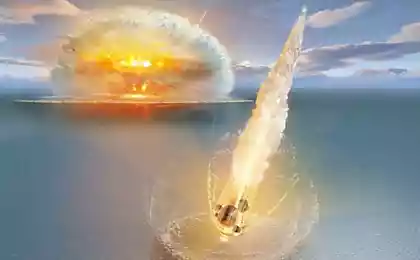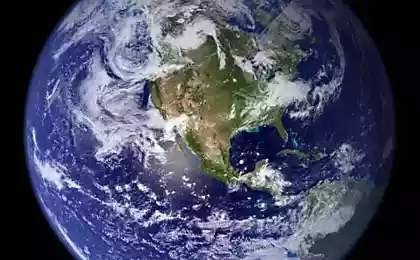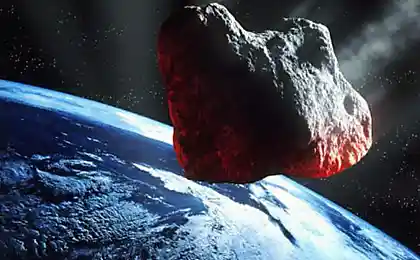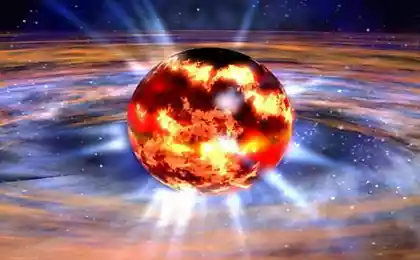1209
The largest meteorites falling on Earth (22 photos)
Much ado was after the fall of the meteorite in Chelyabinsk.
I suggest to read about the top 10 largest meteorites ever falling back to Earth.
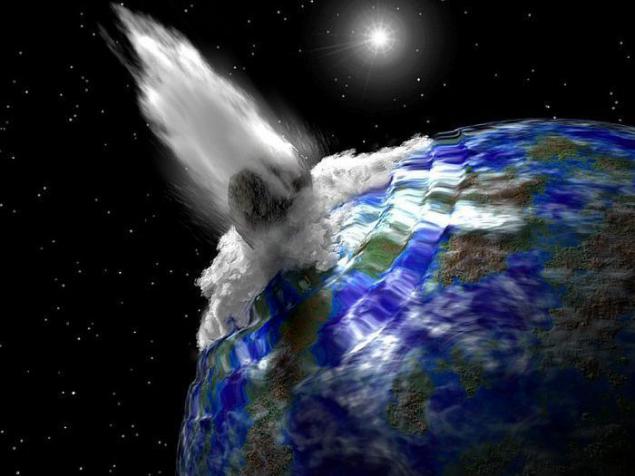
Sutter's Mill Meteorite, April 22, 2012
This meteorite called Sutter Mill appeared on Earth 22 April 2012, moving at a breakneck speed of 29 km / sec.
He flew over the Nevada and California, scattering his red-hot, and exploded over Washington.
The power of the explosion was about 4 kilotons of TNT.
For comparison, the power of yesterday's explosion in the fall of a meteorite
Chelyabinsk amounted to 300 tons of TNT. Scientists have found,
Sutter's Mill meteorite that appeared first days
the existence of our solar system, and the cosmic body-grandparent
4566 formed over 57 million years ago.
Sutter's Mill Meteorite Fragments:
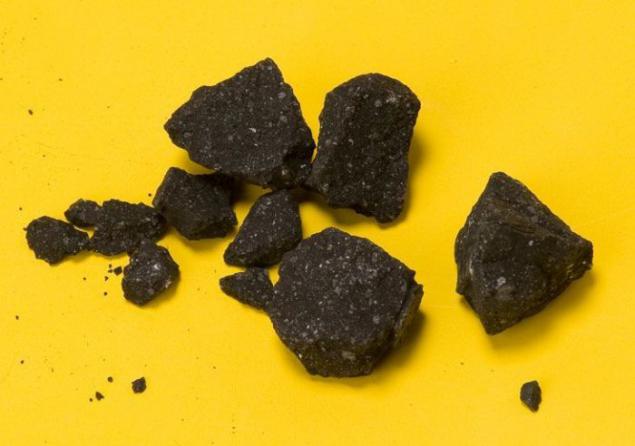
Meteor rain in China, February 11, 2012
Almost a year ago, February 11, 2012 about a hundred meteoric stones fell
an area of 100 km in one of the regions of China.
The largest found meteorite weighed 12.6 kg. It is believed that meteorites
came from the asteroid belt between Mars and Jupiter.
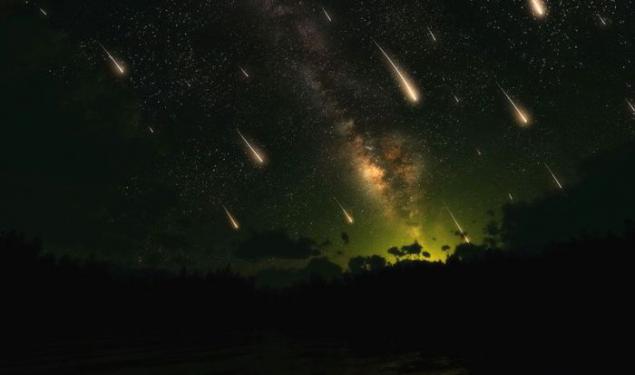
Meteorite from Peru, September 15, 2007
This meteorite fell in Peru near Lake Titicaca, near the border with Bolivia.
Eyewitnesses claimed that at first was a lot of noise,
I like the sound of a falling plane, but then they saw some falling body on fire.
Bright trace of heated white-hot cosmic body,
entered the Earth's atmosphere is called a meteor.
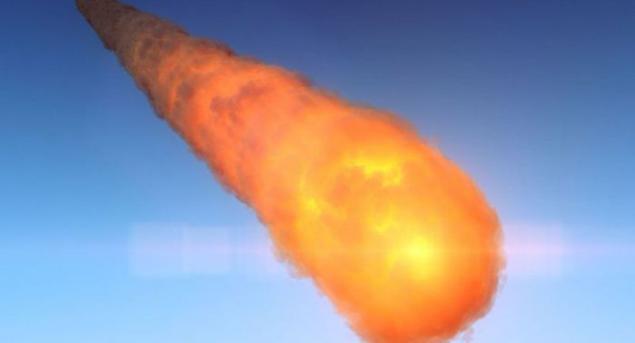
At the crash site of the explosion formed a crater 30 and
depth of 6 meters, of which scored a fountain of boiling water.
Probably, in the meteorite contained toxic substances, because
1500 people living nearby, began severe headaches.
Place meteorite in Peru:
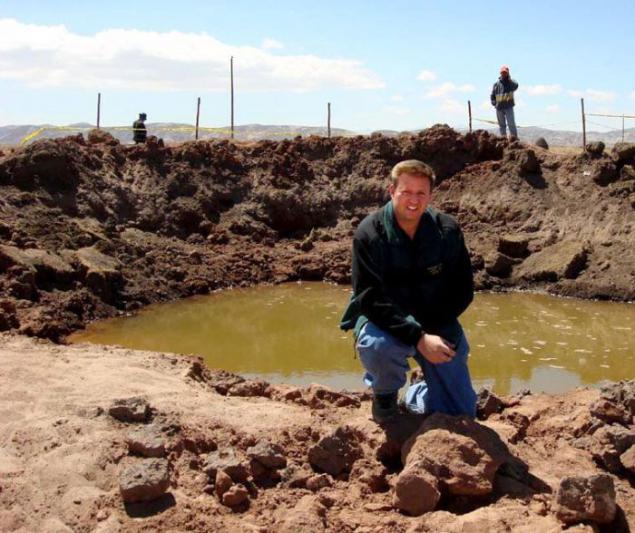
By the way, most of the Earth fall stony meteorites (92.8%), consisting mainly of silicates.
The meteorite, which fell in the Chelyabinsk was the iron, according to first estimates. Fragments of Peruvian meteorite:
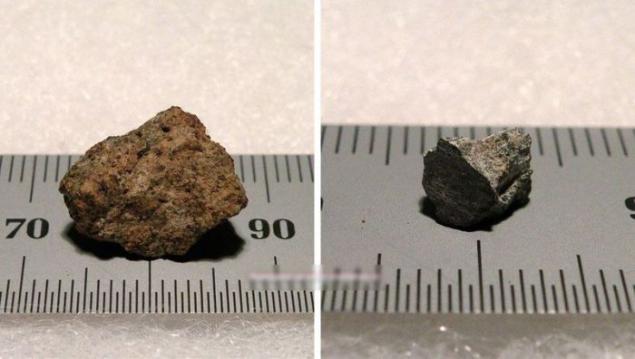
Meteorite Old Urgench from Turkmenistan, June 20, 1998
The meteorite fell near the Turkmen city of Old Urgench, hence its name.
Before the fall of the residents saw a bright light. The biggest part of the meteorite, weighing 820 kg,
He fell into the cotton field, forming a crater around 5 meters.
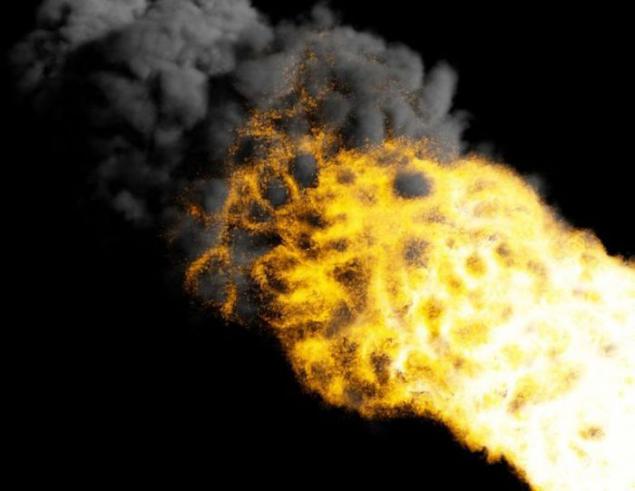
This age of more than 4 billion years, received a certificate of the International Society of meteorite and
It considered the largest among the stony meteorites of all
falling to third in the CIS and in the world. A fragment of a meteorite Turkmen:
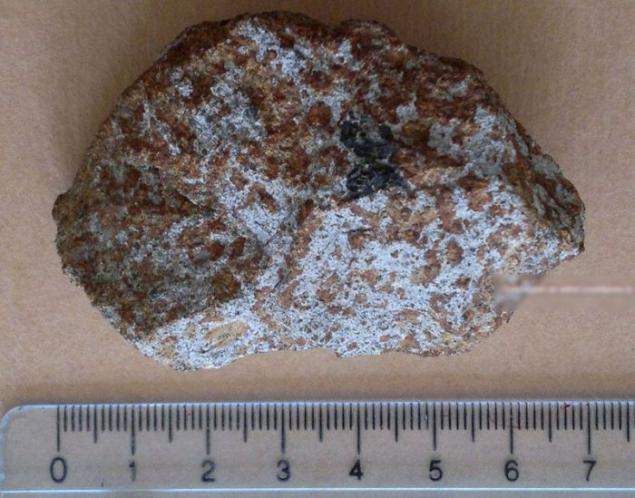
Meteorite Sterlitamak, May 17, 1990
Sterlitamak iron meteorite weighing 315 kg fell on the field of the farm
20 km west of the city Sterlitamak on the night of 17 on May 18, 1990.
In the fall of a meteorite crater with a diameter of 10 meters.
First there were found small metal fragments,
and only a year later, at a depth of 12 meters it was found a piece of the largest weighing 315 kg.
Now meteorite (0.5 x 0.4 x 0.25 meters) is located in
Museum of Archaeology and Ethnography of the Ufa Scientific Center, Russian Academy of Sciences. Fragments of the meteorite.
On the left - a fragment of the same weight of 315 kg:

The largest meteorite rain, China, March 8, 1976
In March 1976, in the Chinese province of Jilin was
the largest stone meteorite rain in the world, which lasted 37 minutes.
Cosmic body fell to the ground at a speed of 12 km / sec. Fantasia on a Theme of meteorites:

Then he found a hundred meteorites, including the largest - 1.7-ton meteorite Jilin (Jilin).
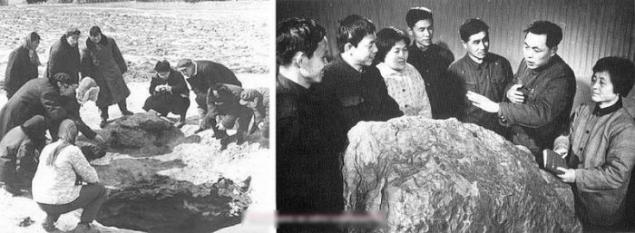
These are the stones fell from the sky on China for 37 minutes:
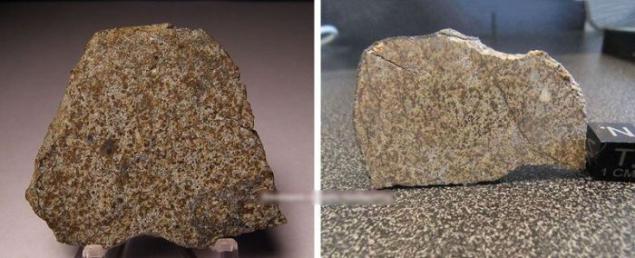
Meteorite Sikhote-Alin, Far East, 12 February 1947
The meteorite fell in the Far East in the Ussuri taiga in the mountains Sikhote-Alin February 12, 1947.
He shattered the atmosphere and fell in the form of iron rain on the area of 10 sq km
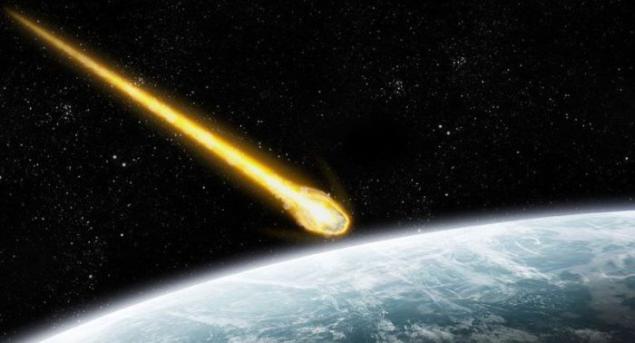
After the fall was formed more than 30 craters with a diameter of 7 to 28 meters and a depth of 6 meters.
It collected about 27 tons of meteoritic material.
Fragments "piece of iron" that fell from the sky during a meteor shower:
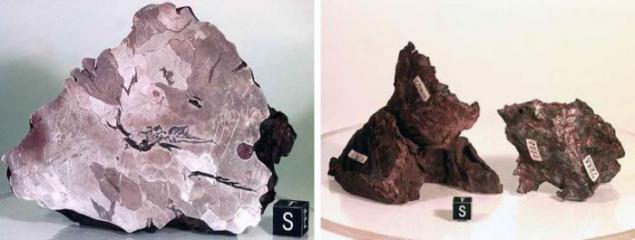
Goba Meteorite, Namibia 1920
Meet this Goba - the largest of the meteorites found! Strictly speaking, he fell down about 80 000 years ago.
This iron giant weighing about 66 tons, and the volume of 9 cubic meters fell
in prehistoric times, and it was found in Namibia in 1920 near Grotfonteyna.
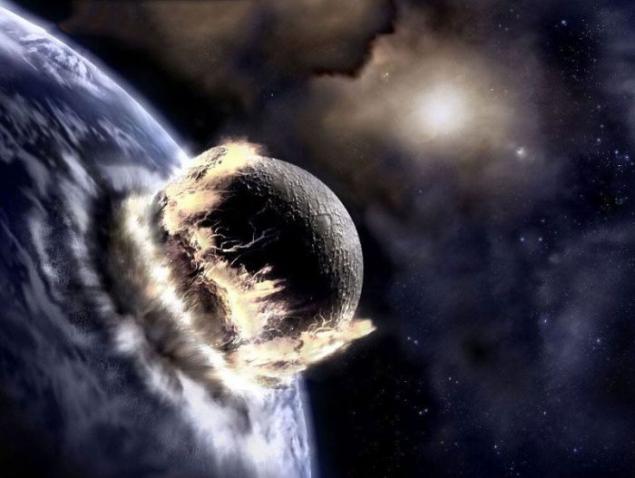
Goba meteorite consists mainly of iron and is considered the most
serious of the celestial bodies of this kind has ever appeared on earth.
He is saved at the crash site in southwest Africa, Namibia, near the farm Hoba West.
This is the biggest piece of iron in the world of natural origin. Since 1920, a meteorite fell slightly:
erosion, research and vandalism took their toll: the meteorite "lost" up to 60 tons.
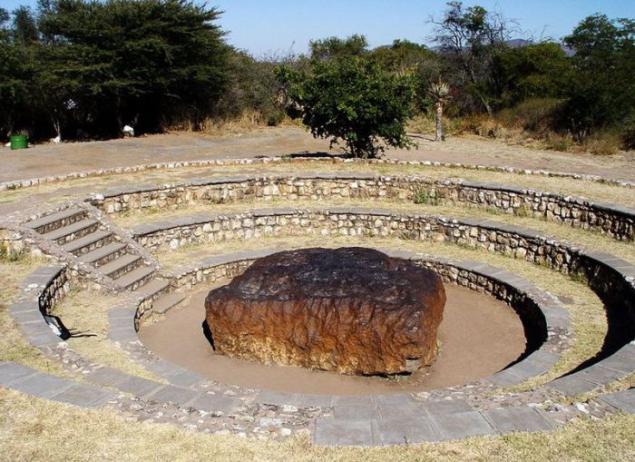
The mystery of the Tunguska meteorite, 1908
June 30, 1908 around 7:00 am over the territory of the basin
Yenisei River from the southeast to the northwest of flying a large fireball.
The flight ended with an explosion at an altitude of 7-10 km above the uninhabited area of taiga.
The blast wave circled the globe twice and
It was recorded observatories around the world. The power of the explosion is estimated at 40-50 megatons,
which corresponds to the energy of the most powerful hydrogen bomb.
Airspeed cosmic giant is tens of kilometers per second.
Weight - from 100 thousand. Up to 1 million tons!
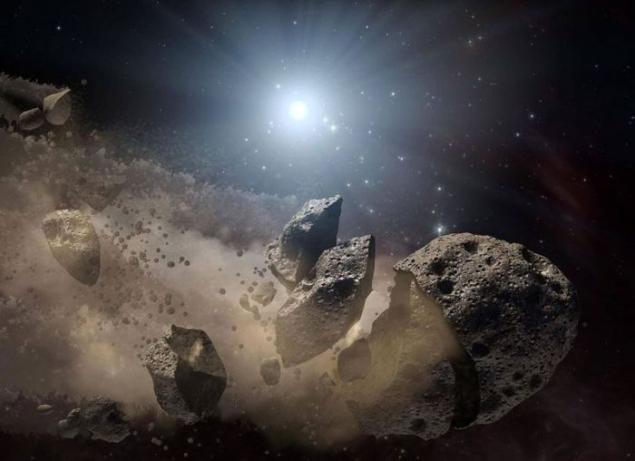
Stony Tunguska River area:
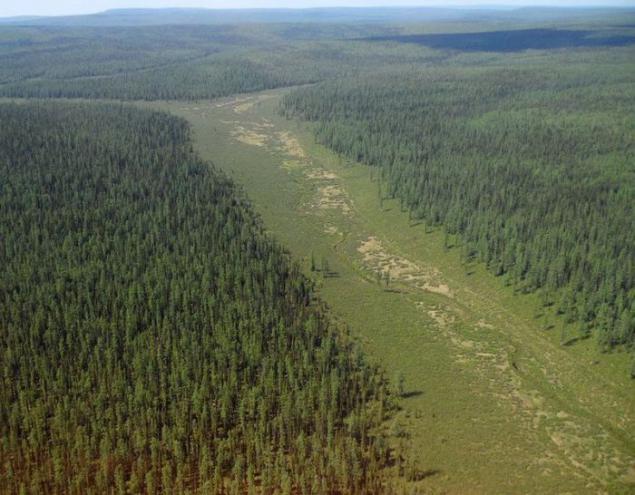
The blast knocked down trees on the territory of more than 2000 square meters. km,
window panes were broken in homes within a few hundred
kilometers from the epicenter. The blast in a radius of about 40 km
animals were destroyed, people have suffered. Within a few days in the territory from the Atlantic to the central
Siberia there was intense airglow and glowing clouds:
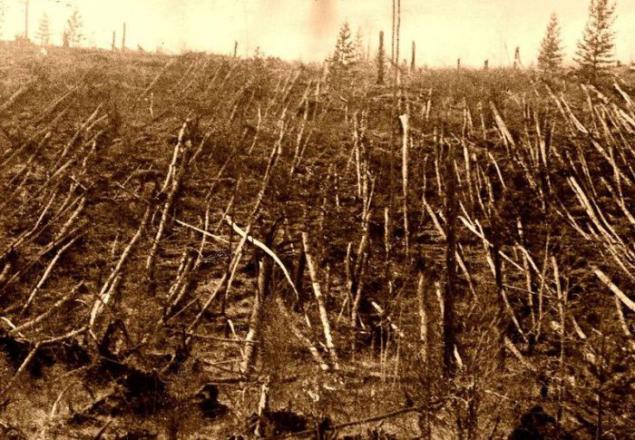
But what was it? If it was a meteorite, then the place of his fall
I was supposed to appear a huge crater depth of half a kilometer.
But none of the expeditions to find it was not possible ... Tunguska meteorite
It refers, on the one hand, one of the most well-studied phenomena,
on the other - one of the most mysterious phenomena of the past century.
Heavenly body exploded in the air, and no remnants of it,
except for the effects of the explosion on the ground were found.
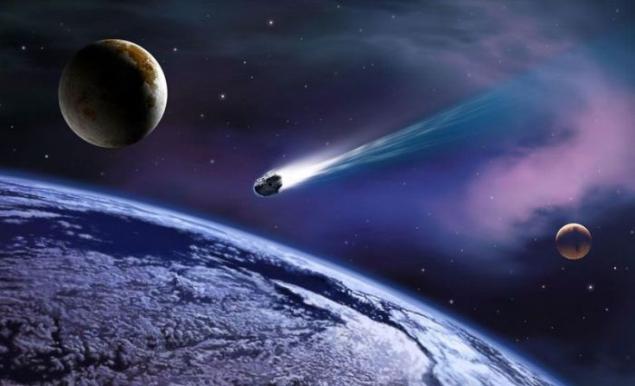
Meteor rain 1833
On the night of November 13, 1833 over the eastern US territory was a meteor rain.
It lasted continuously for 10 hours!
During this time, the Earth's surface has dropped by 240 000 meteorites of different sizes.
The source of the meteor shower in 1833 became the most powerful
known meteor showers. Now this flow is called the Leonids after the constellation Leo,
against which it is seen every year mid-November.
In a much more modest scale, of course. Leonid meteor shower, November 19, 2001:
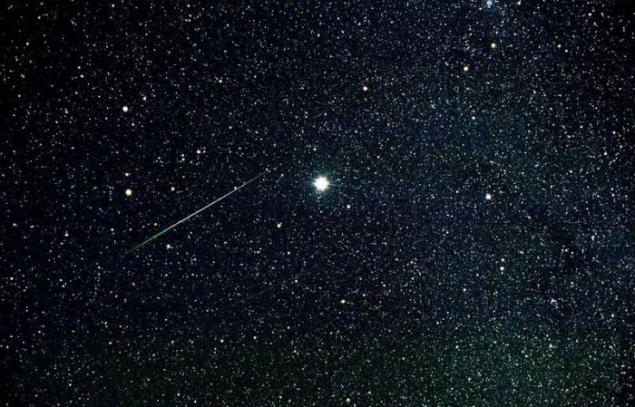
Leonid meteor shower over Monument Valley, USA, November 19, 2012:

Every day about 20 meteor streams pass near the Earth.
There are about 50 comets that could potentially cross the orbit of the planet. Collision Earth
with relatively small celestial bodies the size of a few tens of meters occurring once in 10 years.
I suggest to read about the top 10 largest meteorites ever falling back to Earth.

Sutter's Mill Meteorite, April 22, 2012
This meteorite called Sutter Mill appeared on Earth 22 April 2012, moving at a breakneck speed of 29 km / sec.
He flew over the Nevada and California, scattering his red-hot, and exploded over Washington.
The power of the explosion was about 4 kilotons of TNT.
For comparison, the power of yesterday's explosion in the fall of a meteorite
Chelyabinsk amounted to 300 tons of TNT. Scientists have found,
Sutter's Mill meteorite that appeared first days
the existence of our solar system, and the cosmic body-grandparent
4566 formed over 57 million years ago.
Sutter's Mill Meteorite Fragments:

Meteor rain in China, February 11, 2012
Almost a year ago, February 11, 2012 about a hundred meteoric stones fell
an area of 100 km in one of the regions of China.
The largest found meteorite weighed 12.6 kg. It is believed that meteorites
came from the asteroid belt between Mars and Jupiter.

Meteorite from Peru, September 15, 2007
This meteorite fell in Peru near Lake Titicaca, near the border with Bolivia.
Eyewitnesses claimed that at first was a lot of noise,
I like the sound of a falling plane, but then they saw some falling body on fire.
Bright trace of heated white-hot cosmic body,
entered the Earth's atmosphere is called a meteor.

At the crash site of the explosion formed a crater 30 and
depth of 6 meters, of which scored a fountain of boiling water.
Probably, in the meteorite contained toxic substances, because
1500 people living nearby, began severe headaches.
Place meteorite in Peru:

By the way, most of the Earth fall stony meteorites (92.8%), consisting mainly of silicates.
The meteorite, which fell in the Chelyabinsk was the iron, according to first estimates. Fragments of Peruvian meteorite:

Meteorite Old Urgench from Turkmenistan, June 20, 1998
The meteorite fell near the Turkmen city of Old Urgench, hence its name.
Before the fall of the residents saw a bright light. The biggest part of the meteorite, weighing 820 kg,
He fell into the cotton field, forming a crater around 5 meters.

This age of more than 4 billion years, received a certificate of the International Society of meteorite and
It considered the largest among the stony meteorites of all
falling to third in the CIS and in the world. A fragment of a meteorite Turkmen:

Meteorite Sterlitamak, May 17, 1990
Sterlitamak iron meteorite weighing 315 kg fell on the field of the farm
20 km west of the city Sterlitamak on the night of 17 on May 18, 1990.
In the fall of a meteorite crater with a diameter of 10 meters.
First there were found small metal fragments,
and only a year later, at a depth of 12 meters it was found a piece of the largest weighing 315 kg.
Now meteorite (0.5 x 0.4 x 0.25 meters) is located in
Museum of Archaeology and Ethnography of the Ufa Scientific Center, Russian Academy of Sciences. Fragments of the meteorite.
On the left - a fragment of the same weight of 315 kg:

The largest meteorite rain, China, March 8, 1976
In March 1976, in the Chinese province of Jilin was
the largest stone meteorite rain in the world, which lasted 37 minutes.
Cosmic body fell to the ground at a speed of 12 km / sec. Fantasia on a Theme of meteorites:

Then he found a hundred meteorites, including the largest - 1.7-ton meteorite Jilin (Jilin).

These are the stones fell from the sky on China for 37 minutes:

Meteorite Sikhote-Alin, Far East, 12 February 1947
The meteorite fell in the Far East in the Ussuri taiga in the mountains Sikhote-Alin February 12, 1947.
He shattered the atmosphere and fell in the form of iron rain on the area of 10 sq km

After the fall was formed more than 30 craters with a diameter of 7 to 28 meters and a depth of 6 meters.
It collected about 27 tons of meteoritic material.
Fragments "piece of iron" that fell from the sky during a meteor shower:

Goba Meteorite, Namibia 1920
Meet this Goba - the largest of the meteorites found! Strictly speaking, he fell down about 80 000 years ago.
This iron giant weighing about 66 tons, and the volume of 9 cubic meters fell
in prehistoric times, and it was found in Namibia in 1920 near Grotfonteyna.

Goba meteorite consists mainly of iron and is considered the most
serious of the celestial bodies of this kind has ever appeared on earth.
He is saved at the crash site in southwest Africa, Namibia, near the farm Hoba West.
This is the biggest piece of iron in the world of natural origin. Since 1920, a meteorite fell slightly:
erosion, research and vandalism took their toll: the meteorite "lost" up to 60 tons.

The mystery of the Tunguska meteorite, 1908
June 30, 1908 around 7:00 am over the territory of the basin
Yenisei River from the southeast to the northwest of flying a large fireball.
The flight ended with an explosion at an altitude of 7-10 km above the uninhabited area of taiga.
The blast wave circled the globe twice and
It was recorded observatories around the world. The power of the explosion is estimated at 40-50 megatons,
which corresponds to the energy of the most powerful hydrogen bomb.
Airspeed cosmic giant is tens of kilometers per second.
Weight - from 100 thousand. Up to 1 million tons!

Stony Tunguska River area:

The blast knocked down trees on the territory of more than 2000 square meters. km,
window panes were broken in homes within a few hundred
kilometers from the epicenter. The blast in a radius of about 40 km
animals were destroyed, people have suffered. Within a few days in the territory from the Atlantic to the central
Siberia there was intense airglow and glowing clouds:

But what was it? If it was a meteorite, then the place of his fall
I was supposed to appear a huge crater depth of half a kilometer.
But none of the expeditions to find it was not possible ... Tunguska meteorite
It refers, on the one hand, one of the most well-studied phenomena,
on the other - one of the most mysterious phenomena of the past century.
Heavenly body exploded in the air, and no remnants of it,
except for the effects of the explosion on the ground were found.

Meteor rain 1833
On the night of November 13, 1833 over the eastern US territory was a meteor rain.
It lasted continuously for 10 hours!
During this time, the Earth's surface has dropped by 240 000 meteorites of different sizes.
The source of the meteor shower in 1833 became the most powerful
known meteor showers. Now this flow is called the Leonids after the constellation Leo,
against which it is seen every year mid-November.
In a much more modest scale, of course. Leonid meteor shower, November 19, 2001:

Leonid meteor shower over Monument Valley, USA, November 19, 2012:

Every day about 20 meteor streams pass near the Earth.
There are about 50 comets that could potentially cross the orbit of the planet. Collision Earth
with relatively small celestial bodies the size of a few tens of meters occurring once in 10 years.

